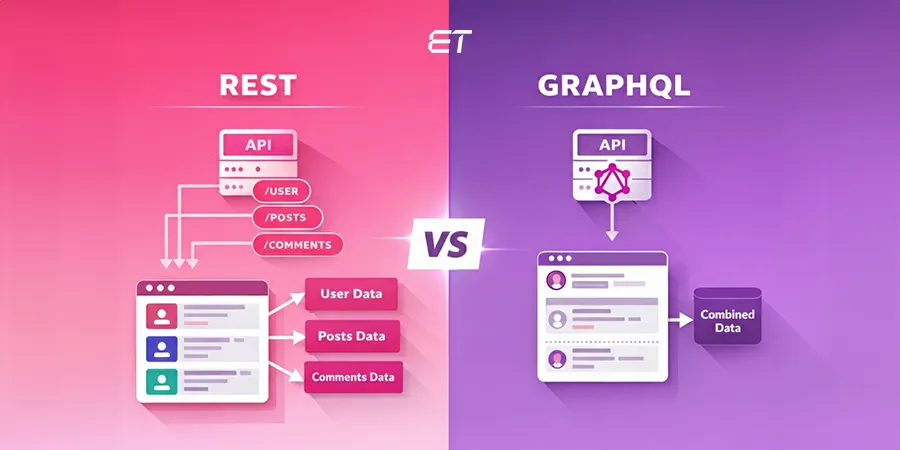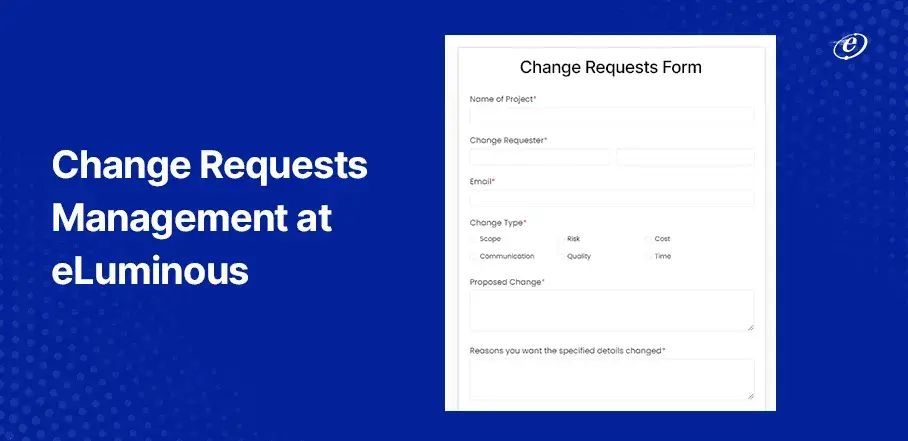
Managing Change Requests at eLuminous | A Complete Guide
As a business, you would want to partner with a software development company that assists you at every project stage. Such a vendor should have a robust ‘change requests’ process in place.
Change requests project management is critical to building fruitful and successful client-vendor relationships. So, whenever you consider hiring a software development firm, ensure they handle software change requests systematically.
In this blog, we will shed some light on this concept. Also, we will explain how our team manages change requests and ensures that clients get the best possible digital product.
So, scroll ahead to understand the concept of change requests and know how team eLuminous has a well-established process.
What are Change Requests?

A change request is a formal proposal to alter a product, system, or project. It is essentially a document outlining a desired change and its rationale.
Here are some key points about change requests:
Purpose
- They provide a structured way to propose and manage changes throughout a project or system’s lifecycle
- They ensure transparency and accountability for any changes made
- They help evaluate the potential impact of changes before they are implemented
Elements
- Description of the proposed change
- Justification for the change
- Impact assessment
- Approval process
Benefits
| Prevention of unauthorized alterations | Improvement in decision-making |
| Enhancement of risk mitigation | Refinement in communication |
| Enhancement of risk mitigation | Refinement in communication |
Examples
| Software Development | Add a new feature or troubleshoot errors |
| Project Management | Adjust project timeline or budget |
| IT Operations | Install new software or update a server |
Overall, change requests are crucial tools for managing alterations in various situations.
The Types of Change Requests
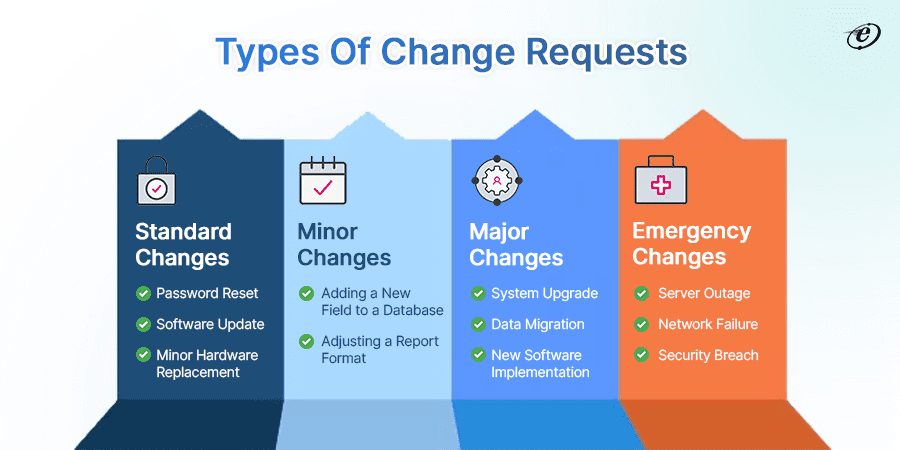
You should know the crucial fundamentals before understanding how our team manages change requests.
Here are the main types of change requests:
- Standard change
- Major change
- Minor change
- Emergency change
Curious to know each type? Just refer to the following table to understand the concepts in a simple manner:
| Feature | Standard Change | Minor Change | Major Change | Emergency Change |
| Approval Process | Pre-approved, no need for an individual review | May require review and approval, dependent on the organization | Requires review and approval by a dedicated board | Immediate implementation, approval sought later |
| Risk Level | Low | Medium | High | High |
| Examples | Password reset, software update, minor hardware replacement | Adding a new field to a database, adjusting a report format | System upgrade, data migration, new software implementation | Server outage, network failure, security breach |
| Frequency | Frequent, routine | Moderate | Occasional | Infrequent, unexpected |
| Impact | Minimal or well-contained | Limited, affecting specific areas or users | Significant, affecting multiple areas or users | Critical, causing service disruption or potential data loss |
| Documentation | Detailed procedures exist for the execution | May require some documentation based on organizational policy | Requires comprehensive documentation and risk assessment | Documented as soon as possible after implementation |
At eLuminous Technologies, we take care of all the types of change requests as per the client’s demand.
Understanding Change Requests Management
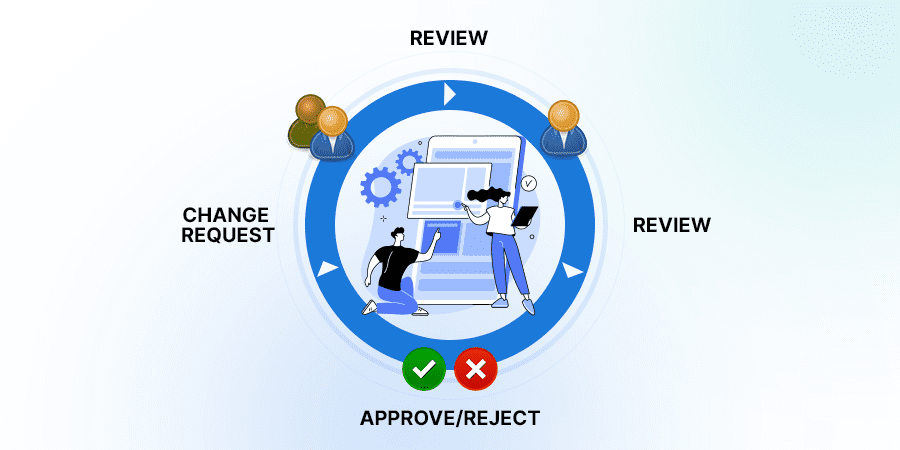
A formal process is necessary to handle proposals for client software change requests. This procedure goes by the name, ‘change request management.’ (CRM)
A CRM includes the following components:
- Tools
- Systems
- Procedures
A dedicated manager considers the following change request types:
- Internal: From the project team
- External: From the clients or stakeholders
Now, there is a standard procedure for processing change requests (CR). This flow chart will give you a fair idea:
| Initialization of Change Request (CR)
↓ Submission of CR through a formal document ↓ Evaluation of CR from the relevant stakeholders ↓ Approval of the change request ↓ Implementation of the CR post approval ↓ Monitoring of the change request implementation |
Managing Change Requests | The eLuminous Way
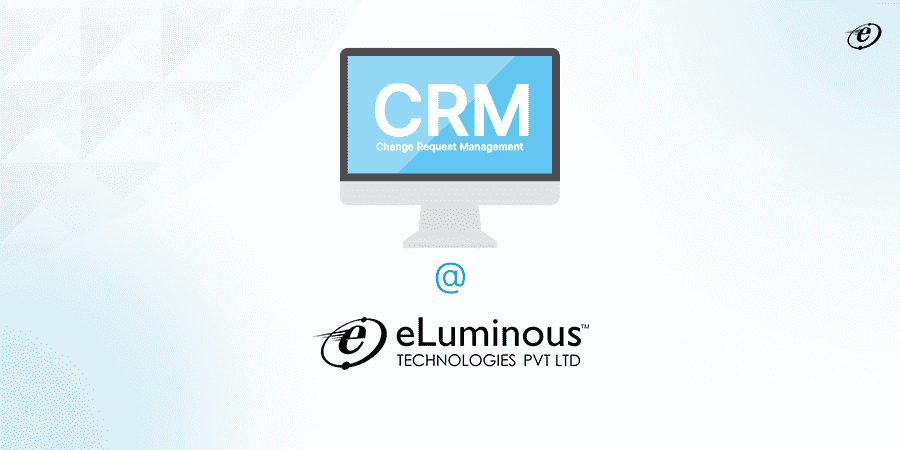
By now, you must have a decent understanding of change requests. In this section, we will focus on the process at our organization that handles various types of change requests.
At eLuminuous Technologies, we have a well-set process for managing change requests.
Here is the flowchart:
| Change request submission → Request review (from Project Manager)
↓ Thorough assessment of the CR (Cost-benefit analysis, feasibility, resource availability) ↓ Consultation with the stakeholder → Approval from the review committee ↓ Change request implementation (planning, execution, testing, validation) ↓ Change request closure
|
Our Best Practices for Managing Change Requests

In some cases, change requests become inevitable. Businesses like you want to alter the project to meet unexpected demands or market fluctuations.
At eLuminous, our team is well-equipped to handle such scenarios. So, to manage various types of change requests, we adhere to some straightforward rules. Here is a simple list of some top practices that we follow:
- Clear communication: Our submission process is clear and transparent
- Systematic segregation: We categorize change requests by impact and urgency
- Leveraging technology: Automating tasks like routing, approvals, and notifications leads to swift change requests for project management
- Feedback encouragement: We aim for continuous improvement by gathering regular feedback
- Efficient tracking: Our team keeps track of successes and failures from previous change requests
- Metric analysis: We measure parameters like cycle times and approval rates to avoid risks and enhance the CR cycle
Overall, this seamless process and an array of proven practices enable us to handle change requests efficiently.
The Impact of Change Requests Project Management

Implementing proper change request management (CRM) has several positive outcomes for individuals, teams, and organizations. Here are some key benefits:
Individual Level
The employees feel they can voice potential improvements. Resultantly, they invest and contribute to the process to a great extent.
In addition, analyzing and implementing changes hones critical thinking, problem-solving, and communication skills. Being part of a well-defined process gives individuals ownership and confidence in their contributions.
Team Level
CRM fosters communication and alignment between team members as they work together to implement changes. So, by having a clear path for proposing and managing changes, there is a decrease in conflict and confusion, leading to smoother workflows.
Finally, documenting and analyzing change requests creates a knowledge base for future projects.
Organizational Level
Responding effectively to changing markets and internal needs empowers IT vendors to adapt faster. Furthermore, proactive analysis of potential impacts helps mitigate risks effectively.
Organizations achieve better results with fewer resources by prioritizing changes that align with strategic goals. CRM helps prevent rework by managing changes efficiently, leading to cost savings.
Responsive and transparent change management shows clients that their IT partner caters to their requirements effectively. Overall, proper CRM acts as a catalyst for continuous improvement, innovation, and organizational success.
To Wrap Up
Managing change requests effectively is not just about avoiding roadblocks. The process is crucial for driving project success.
At eLuminous, we ensure your software evolves seamlessly with our robust, client-centric approach. For this purpose, we have a systematic change requests project management process in place.
So, ensure you choose a partner who understands your vision, adapts with agility, and delivers results. To experience positive results in software, website, or portal development, contact us today for a free consultation!



